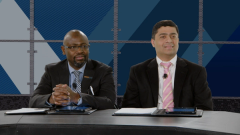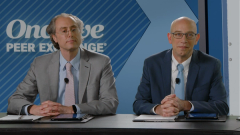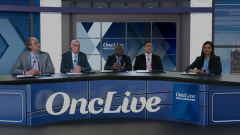
Management of Adverse Events Associated with Durvalumab + Chemotherapy
Vivek Subbiah, MD, analyzes adverse events observed with durvalumab plus chemotherapy in patients with SCLC and how they can be managed.
Episodes in this series

Charu Aggarwal, MD, MPH: Vivek, can you talk to us about some of the adverse events that were observed on this study, especially when durvalumab was combined with chemotherapy and how do you usually manage them in practice?
Vivek Subbiah, MD: That was a great question because in the context of ASCO [American Society of Clinical Oncology] 2022 the Caspian PLO data was presented. Again, for everyone here, what is PLO? PLO is patient report outcomes and there is this NCI defined patient report outcomes criteria called PLOCTCE, which is the patient reported outcomes, common terminology criteria for adverse events. In this Caspian study, they ask patients these questions 164 of the 537 on all patients were asked these questions. And it was interesting. They ask questions directly from patients. It's not doctor reported outcomes, it's patients, self-reported outcomes. They ask for presence or absence of rash, pain, swelling, redness, again, a frequency of arm, like swelling, pain in the abdomen, shivering or shaking or chills, and severity. Severity of the itching, severity of the numbness or tingling in the hand, mainly from the platinum-based agents. And is it going to be an exacerbated by immunotherapy or mouth source, throat source from the chemotherapy and immunotherapy combination and handful syndrome in addition to dry mouth. These were the patient reported outcomes adverse events were asked to patients and they were asked to fill up. Interestingly, what the data showed the self-reported data from patients showed in the Caspian study that the 11 adverse events examined during the 24 weeks after starting treatment as reported by minority of patients in both the arms, mostly with rare events rates and patterns of adverse events, the adverse events over time were similar in both the arms, again, it could be that this is a trial population, motivated patients pre-selected population, but we don't see any differences in terms of adverse events by adding an immunotherapy checkpoint. I don't know if you see that in the real world as well. Maybe Jared can answer that.
Jared Weiss, MD: The effects that we don't understand our patient experience very well, right? Every PLO study ever done tells us that the most remarkable finding is always the difference between the patient reported outcomes and the clinician reported outcomes, because if you don't ask in a busy clinic, you don't know. The PLOs are very useful for bringing that out. And they're complimentary to the physician provided data. Our patients suffer from fatigue a lot more than we recognize. And the mouth sores and rashes are often a lot worse than we recognize.
Charu Aggarwal, MD, MPH: Charlie, could you talk to us about real-world data on chemotherapy plus durvalumab that was recently presented at ELCC [European Lung Cancer Conference]. They were trying to see what actually happens when these drugs are administered in the real world.
Charles Rudin, MD, PhD: That data was reassuring. It's quite similar to the clinical trial data to Vivek’s point. This wasn't it of course, was a selected trial population with good performance status to start out, but as was pointed out, patients with small cell lung cancer often present with poor performance status because of disease and rapidly improve actually with initiation of therapy and real world data, looking at patients treated with chemo, immunotherapy actually had very similar outcomes in terms of progression-free survival and early data with survival as was seen in the clinical trials. These are robust results.
Charu Aggarwal, MD, MPH: They reflect what Taofeek was talking about also that it didn't seem to matter if you went above 4 cycles of chemotherapy, you had toxicity, but maybe we don't get that much bang for the buck in terms of efficacy. It affirms our current practice, affirms what we saw in clinical trials. It's reassuring.
Transcript edited for clarity.








































